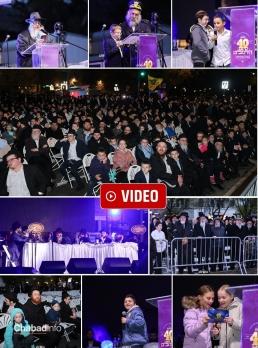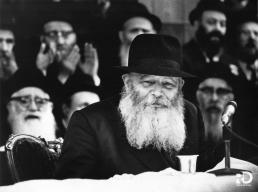The Passion for Torah
Who Said “A Bachur Should Have More Enjoyment from Torah Than From Going On Mivtzaim?” • A Pre-Shavos Farbrengen with Rabbi Menachem Mendel Groner, from the Rebbe’s shluchim to Eretz Yisrael • By the Beis Moshiach Magazine • Full Article
Around Lag B’Omer 5738 there were events that transpired in Crown Heights having to do with the hechsher on meat and milk. Some maintained that Chabad and “shpitz Chabad” had to stop eating a certain hechsher.
At the farbrengen that took place on Lag B’Omer that year, the Rebbe said that there are bachurim and members of the kollel who mix in to these matters. “A yeshiva bachur and kollel yungerman need not be at all involved in these matters. The job of a bachur is to sit and learn. It is not for you to know who gives a hechsher on meat and who gives a hechsher on milk. This is not a bachur’s business.”
The Rebbe often spoke about Torah study and said that even those who don’t have the ability to learn l’iyuna (in depth analysis) should at least learn l’girsa (textual proficiency), but a bachur must learn since his entire concern is Torah study and nothing else.
The Rebbe said, “That bachurim are sent on mivtzaim, this is according to the instruction of our Rebbeim and is not a contradiction. There is the time, most of the time, that he sits and learns, and there are a few hours a week in which he goes on mivtzaim. But he needs to know that when he sits and learns he should not be thinking about mivtzaim.”
Then the Rebbe said something interesting: “On the part of the G-dly soul, there is no difference between mivtzaim and Torah study; both are the same thing. But what is demanded of a bachur is that on the part of his animal soul, Torah study should be more important to him than mivtzaim. Meaning, we need to see that a bachur has more enjoyment from Torah study than from going on mivtzaim.”
Indeed, there are many bachurim who sit and learn but they don’t feel a geshmak (enjoyment) in learning. “It’s boring.” “What does it do for me?” “So we’re learning about an ox that was sold for carrying loads and how a piece of land is acquired – what difference does this make to me?” So yes, when bachurim go on tahalucha, it’s more enjoyable than sitting in front of a Gemara in yeshiva.
The Rebbe says, it is not supposed to be this way. Even the animal soul needs to have a chayus in learning; even more than in mivtzaim.
L’chaim, l’chaim!
SUDDEN VISIT FROM THE REBBE
In the summer of 5733, before the Yom Kippur War, the Rebbe spoke a lot about the verse, “Out of the mouths of babes and sucklings You have established strength because of Your foes, to silence the enemy and avenger.” In other words, in order to silence our enemies, the youngsters need to learn Torah. The Rebbe asked that for the summer, as many children as possible be placed in Torah camps.
Bachurim were drafted to camps and day camps. I preferred sitting and learning but since the Rebbe said to go to camp, I asked the Rebbe what to do. The answer I got said, “As publicized; as a mashpia directs.”
I was learning in Morristown at the time and my mashpia in yeshiva was Rabbi Elimelech (Meilich) Zwiebel, who suggested: Learn half a day and during the second half of the day, teach Judaism to children.
At that time, something interesting took place. It was an ordinary day in the middle of the week when the Rebbe entered his car to drive from his home to 770. The driver that day was Rabbi Binyamin Klein and the Rebbe suddenly told him, “Take me to the kollel.”
This was at eleven in the morning.
The kollel was located on Union Street, behind 770. The Rebbe suddenly walked in to the kollel past the official time when learning was supposed to begin. Obviously, the members of the kollel did not expect to see the Rebbe. One was sitting and learning Chitas, another was learning Likutei Torah, another was looking at some brochure. The Rebbe walked between the tables and looked. Then he went to the bulletin board and read what it said. He then left for 770.
That Shabbos there was a farbrengen I attended. In the middle of the farbrengen, the Rebbe began speaking sadly and I remember what he said. “I have a taava (craving).” The Rebbe usually used terms like “bakasha nafshis” (soul request) or “baskasha meyuchedes” (special request). A taava is the highest level of ratzon (will); we know that regarding a taava there are no questions and no explanations. It comes from the highest part of the soul.
The Rebbe said his taava is that “Those who are by me should know how to learn.” Here, he went on to speak sadly about what he saw in the kollel in the middle of the week.
The Rebbe suggested, in order to rectify this matter, that every kollel put out an anthology of chiddushei Torah written by the members of the kollel.
What is the point of an anthology of chiddushei Torah?
When they began publishing anthologies of chiddushei Torah in Chabad yeshivos, elder Chassidim like R’ Nissan Nemenov yelled that it was forbidden. Why? Because when a bachur writes a pilpul and it is printed under his name, it will be an ego-booster. “I wrote a pilpul!,” while Chassidus demands bittul.
The Rebbe said then that even during the time of the Rebbe Rayatz, there were issues of HaTamim in which they wrote chiddushei Torah under their own names.
R’ Mendel Futerfas asked me: What does the Rebbe “gain” by having anthologies of chiddushei Torah published? He answered his own question: When a bachur writes a pilpul that is printed and disseminated, he puts himself into seriously learning the topic. He works on it for three weeks or a month in which he is completely immersed in the topic so that he will produce something worthy. The Rebbe wants that at least during that time, a bachur will be submersed in learning on every level of his consciousness, and this is the reason behind the Rebbe’s initiative.
We need to know that the Rebbe has a taava and his taava is that we sit and learn. I know that when the Rebbe received a report of the achievements in learning of the bachurim he had tremendous nachas (and contrariwise too).
THE REBBE LAYS DOWN THE LAW
I knew a Chassidishe bachur who went on kevutza. He was a very Chassidishe bachur, shpitz Chabad. He maintained that his main reason for going to 770 was to be with the Rebbe and learn from the Rebbe’s ways. “I could have stayed in yeshiva in Eretz Yisrael to learn. When I’m here, it’s to watch everything the Rebbe does and learn from his ways.”
At davening, he always watched every move the Rebbe made and he did as the Rebbe did. On nights when there was yechidus, he (and some other bachurim) would stand near “Gan Eden HaTachton” and wait for people to come out of yechidus in order to ask them what the Rebbe told them. Sometimes, yechidus nights lasted until seven in the morning and it was only when the Rebbe left for home that they went to sleep.
This bachur would stand the entire time in order to see who went in and who came out, and try to find out everything that the Rebbe said in yechidus. He would go to sleep in the morning. If it was a Monday or Thursday, he would stay for the Torah-reading and then go to sleep until three or four in the afternoon and then daven mincha with the Rebbe. This was his life in 770; everything revolved around the Rebbe.
What about learning? “I didn’t come here to learn,” he explained. “I could have stayed in Eretz Yisrael for that.”
The hanhala did not like his behavior and said a bachur needs to learn, while he maintained no, a bachur needs to live with the Rebbe.
At a certain point, it was his turn for yechidus for his birthday. The Rebbe had already gotten a report about this bachur’s behavior from the hanhala.
In yechidus, the Rebbe said to him: Since I heard that you maintain that you did not come here to learn and you know that the Rambam says that it is forbidden to leave Eretz Yisrael except to learn, I understand you have difficulties learning. You need to return to Eretz Yisrael immediately but not to yeshiva in Kfar Chabad where you learned; but to a yeshiva where you work half a day and learn half a day, because it is hard for you to learn all day. So maybe a yeshiva like … [the Rebbe mentioned a name of a yeshiva] is suitable for you.
The Rebbe took a bachur who considered himself a big Chassid, shpitz Chabad, and gave him a major bitush (figurative thrashing), “You need to go back to a different yeshiva where they learn half a day.”
He left the yechidus and didn’t sleep the entire night. He told me, “I sweated all night and in the morning I wrote to the Rebbe: ‘And if I decide that I will start learning, can I stay?’ The Rebbe crossed out the words ‘can I stay,’ and wrote, ‘legal preference for the Holy Land,’ meaning, to return immediately to Eretz Yisrael without questions and calculations.”
Brokenhearted, he went to his mashpia who enlightened him. “Are you making conditions with the Rebbe that you write, ‘and if I decide to learn’?! You need to actually start learning and when you do, you can stay!”
From that day on, he began learning. Until then, he would stand in the front row at every tefilla near the Rebbe so he would have a good view, and could learn and contemplate (the Rebbe’s every move). From that point on, he would stand in the back in shame. He could not show his face to the Rebbe. He was very frightened of the Rebbe and until today, that fear is still with him. The main thing is that from that day on, he took his learning seriously and sat and learned diligently.
What do we learn from this story? With all due respect for Chassidishe sentiments, the Rebbe accepts no excuses when it comes at the expense of Torah study. The Rebbe did not distance him; on the contrary. I once saw when he passed by the Rebbe for kos shel bracha and the Rebbe gave him a bottle of mashke. But to the Rebbe it is important that bachurim toil in Torah study.
This is the Rebbe’s greatest and deepest taava, that we sit and learn.
When the Rebbe says again and again “I demand just one thing of you, be immersed in learning, sit and learn! This is what I want,” and this is what a bachur does, then by doing so he connects to the Rebbe in the deepest way. Learning like this has a different energy, a real geshmak. Just like when a bachur goes on mivtzaim. By putting tefillin on with yet another Jew, you feel a sense of satisfaction that you did something good and useful. That’s the way it should be with learning.
This is what it means to receive the Torah with simcha and pnimiyus. What is pnimiyus? In the Tanya shiur that I give in my city of Kiryat Gat to traditional Jews, we learned about love of Hashem. In one shiur, I asked them if a person yells, “Hashem, I love you,” and rocks back and forth and shouts, does he really love Hashem or not?
They said, “Yes, of course.”
I told them this is incorrect because love of Hashem is not expressed by shouting. If you love Hashem, it is expressed by your refraining from doing a sin that you want to do; that proves that you love Hashem.
In the sicha of 28 Nissan 5751, the Rebbe said, “Do all that you can” and “I give the matter over to you.”
Right after the sicha, everyone began shouting “Ad mosai, ad mosai?” As this was going on, the Chassid Rabbi Zalman Gurary passed near the Rebbe and the Rebbe said, “it not touch and it did not affect.”
What does that mean when the Rebbe had inspired everyone and now they were shouting “ad mosai” from the depths of their heart?
It was just a slogan. They shouted loudly, but in order to bring the Geula you need to take action through avoda and personal toil.
The same is true for learning. A bachur who does not have the desire to learn needs to make an accounting. There are bachurim who have the desire to learn and they enjoy learning. However, there are bachurim who don’t, but such a bachur says to himself, I am learning because this is the Rebbe’s true desire. A bachur like this is exclusively connected to the Rebbe during that time.
This ought to be the preparation of a Chassidishe bachur for Shavuos, Mattan Torah, and I heard this from the Rebbe countless times.
From a farbrengen with talmidim in Yeshivas Tomchei Tmimim in Ohr Yehuda.
*
The magazine can be obtained in stores around Crown Heights. To purchase a subscription, please go to: bmoshiach.org
148
Join ChabadInfo's News Roundup and alerts for the HOTTEST Chabad news and updates!










































